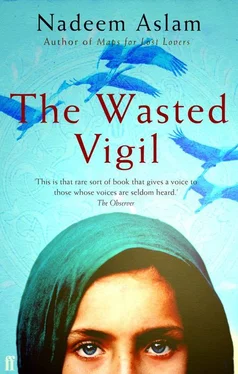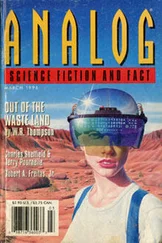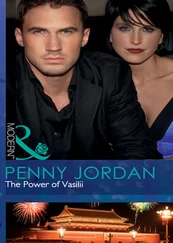Nadeem Aslam - The Wasted Vigil
Здесь есть возможность читать онлайн «Nadeem Aslam - The Wasted Vigil» весь текст электронной книги совершенно бесплатно (целиком полную версию без сокращений). В некоторых случаях можно слушать аудио, скачать через торрент в формате fb2 и присутствует краткое содержание. Год выпуска: 2009, Издательство: Faber and Faber, Жанр: Современная проза, на английском языке. Описание произведения, (предисловие) а так же отзывы посетителей доступны на портале библиотеки ЛибКат.
- Название:The Wasted Vigil
- Автор:
- Издательство:Faber and Faber
- Жанр:
- Год:2009
- ISBN:нет данных
- Рейтинг книги:4 / 5. Голосов: 1
-
Избранное:Добавить в избранное
- Отзывы:
-
Ваша оценка:
- 80
- 1
- 2
- 3
- 4
- 5
The Wasted Vigil: краткое содержание, описание и аннотация
Предлагаем к чтению аннотацию, описание, краткое содержание или предисловие (зависит от того, что написал сам автор книги «The Wasted Vigil»). Если вы не нашли необходимую информацию о книге — напишите в комментариях, мы постараемся отыскать её.
The Wasted Vigil — читать онлайн бесплатно полную книгу (весь текст) целиком
Ниже представлен текст книги, разбитый по страницам. Система сохранения места последней прочитанной страницы, позволяет с удобством читать онлайн бесплатно книгу «The Wasted Vigil», без необходимости каждый раз заново искать на чём Вы остановились. Поставьте закладку, и сможете в любой момент перейти на страницу, на которой закончили чтение.
Интервал:
Закладка:
And in their cunning they know them well enough to be able to undermine Islam, to turn ordinary Muslims against the holy warriors. Instead of saying ‘jihadis’, the newspapers and radio are being advised to employ the word ‘irhabis’, which means ‘terrorists’. Instead of ‘jihad’, they are being told to use ‘hirabah’ — ‘unholy war’. Instead of ‘mujahidin’, it’s ‘mufsidoon’ — ‘the mayhem makers’.
He straightens and stretches his back, taking a moment’s break from the work, wiping the sweat off his brow. Walking to the water’s edge, he removes his shirt and splashes water onto his torso.
‘How did you get the scar on your side?’ David asks when he returns, buttoning up the shirt.
‘Accident.’
During the previous days the two have talked only when Casa has initiated a conversation. He gives quick answers if David ever makes an enquiry, feeling safe only when information about him is concealed. Already he has made the mistake of showing Dunia his calluses. But he won’t succumb to her again.
When David asked if his name was short for Kasam, he had said no. The man hadn’t guessed the real name, so a yes wouldn’t have mattered, but it was important to make these people think their every instinct and independent idea about him was inaccurate. He will tell them what to think. ‘It’s short for Qaisar actually.’
Now he pretends not to hear because David is asking, ‘What kind of accident was it?’
One of the Tomahawks the Americans had sent into the jihad training camp had caused a sheet of corrugated metal to fly into his waist where he was bowing in prayer. The heat of the explosion had sterilised the metal just before it entered him — it was glowing, the entire width and length of it, a vibrating white-red — so there was no immediate infection but the wound had festered later, the stitches coming apart during a training expedition into remote mountains. With the hospital a week away, they had laid him on his side, scratched off onto the wound the ignitable powder from the heads of five hundred matchsticks and lit it, a method of cauterising that has left a disfigurement the size of a hand on his flank.
The look on David’s face is intense and yet, paradoxically, unfocused. Casa feels his thoughts are being read.
He wishes the man would take his eyes off him.
‘How old are you, Casa? Twenty-one, twenty-two …?’
‘Yes.’
Perhaps his hostile confusion has seeped into his tone because David lowers his head now and goes back to work.
He remains standing, looking at the carved seat of the canoe — bone-like, smooth to the touch. David had had it made in Jalalabad and Casa had weighed it in his hands many times, testing the heft. It has been fitted in already but he could pull it out without much difficulty. The first blood spilled in Islam was with a camel’s jawbone, the idolaters had interrupted the Muslims’ prayer and blessed Saad of Zuhrah had wounded one of them with the nearest thing within reach.
David is still bent to his task, the back of his head vulnerable.
If the man is so keen to mark the coming together of the United States and the lands of Islam he could name the boat the Guantanamo . If it’s the celebration of heroes that is on his mind, how about the Osama or the ISI ?
The voices of the two women — Dunia and the Russian — have begun to drift towards him from the direction of the orchard, and he tries to hide his alarm at that too. The landmine. But nothing can be done, so he continues ladling hot water down each wooden rib — the tough bands that have been soaking in the lake for two days — until it is supple enough and then bends it with his hands, and his feet, to put into the canoe. David said the bottom has to be more flat than circular, more circular than flat, or the craft would be tippy. The ribs will be left in overnight to stretch and shape the bark: tomorrow they’ll be taken out for a short time, have their ends trimmed to precision, and be put back in permanently.
He needs that landmine. He will not allow anyone to capture him. Bihzad said that while he was at the Bagram military prison he had tried to kill himself by chewing on an artery in his arm — becoming desperate one night after learning that, back in December 2002, two prisoners there had been beaten to death by their American captors.
The Bagram .
Last night in the glasshouse when he had opened the book entitled Bihzad , he had found it to be full of coloured pictures. It was like Marcus’s house. He had spent almost two hours looking at them and reading the accompanying texts until the battery in the flashlight had gone out like someone blinded. They seemed to be some of the most beautiful things he had ever seen, despite the fact that, against Allah’s wishes, they depicted animals and humans. Rustam, the grandson of the king of Kabul, avenged his own impending death in one picture: dressed in his tiger skin, and gored by the lances that had been planted upright at the bottom of a deep pit, he called out to his brother who had set this trap for him. ‘Throw me my bow at least so I won’t be eaten by lions.’ Overcome by mercy, the brother did what he was asked so that Rustam sent forth an arrow and shot him through the tree trunk behind which he was standing. To Rustam’s arrow, the thick-boled tree was as flimsy as the bark that is this boat.
The breeze swings and carries to him the sound of the two women again. The landmine is the pit he has dug and lined with spears. He wills the two women away from it. Asks help from Allah.
David has stopped talking because the news is being broadcast on the radio.
Casa always switches it off when the news finishes and music or discussion comes on air, telling David it is to preserve the batteries, but really because these songs and seven varieties of opinion are like stings to him, the Taliban having banned such frivolities during their regime.
How keen everyone is to make this world their home, forgetting its impermanence. It’s like trying to see and name constellations in a fireworks display.
The signs of Allah are there but they refuse to see it. After he came back from the moon and was touring the various countries of the world, Neil Armstrong had suddenly stopped in a bazaar one day, his face ashen, and asked what the sound issuing from a nearby minaret was. On being told that it was the Muslim call to prayer, he began to shed tears and told them he had heard that sound while on the moon, that it had haunted him ever since. He converted to Islam straight away.
‘David, could you please come to the house for a minute?’ Marcus has appeared and is beckoning with his one hand.
‘Give me a minute. We’d like to finish as much of the ribbing today as possible. We’ll seal it with the gum tomorrow evening and be on the water by early morning the day after.’
‘It’s rather urgent,’ says the Englishman and the tone of his voice makes David look towards him.
‘Right now?’
‘Yes.’
Casa stays behind for a while but then follows them, standing on the threshold beside the cypress trees and looking into the kitchen where the four others have gathered.
‘We thought we should tell you, David,’ Marcus is saying.
‘And you have no idea who it was who knocked on your window?’ David asks the girl.
Dunia shakes her head. ‘I wasn’t going to tell you anything but the thought of going back to Usha frightens me.’
‘There is no question of that,’ David says, and Marcus agrees:
‘Yes, you must stay here until your father comes back from Kabul.’
Lara and David exchange a few sentences in English. Marcus joins in and concludes in Pashto: ‘I am sure there was no one at her window — they just made that up.’
Читать дальшеИнтервал:
Закладка:
Похожие книги на «The Wasted Vigil»
Представляем Вашему вниманию похожие книги на «The Wasted Vigil» списком для выбора. Мы отобрали схожую по названию и смыслу литературу в надежде предоставить читателям больше вариантов отыскать новые, интересные, ещё непрочитанные произведения.
Обсуждение, отзывы о книге «The Wasted Vigil» и просто собственные мнения читателей. Оставьте ваши комментарии, напишите, что Вы думаете о произведении, его смысле или главных героях. Укажите что конкретно понравилось, а что нет, и почему Вы так считаете.












